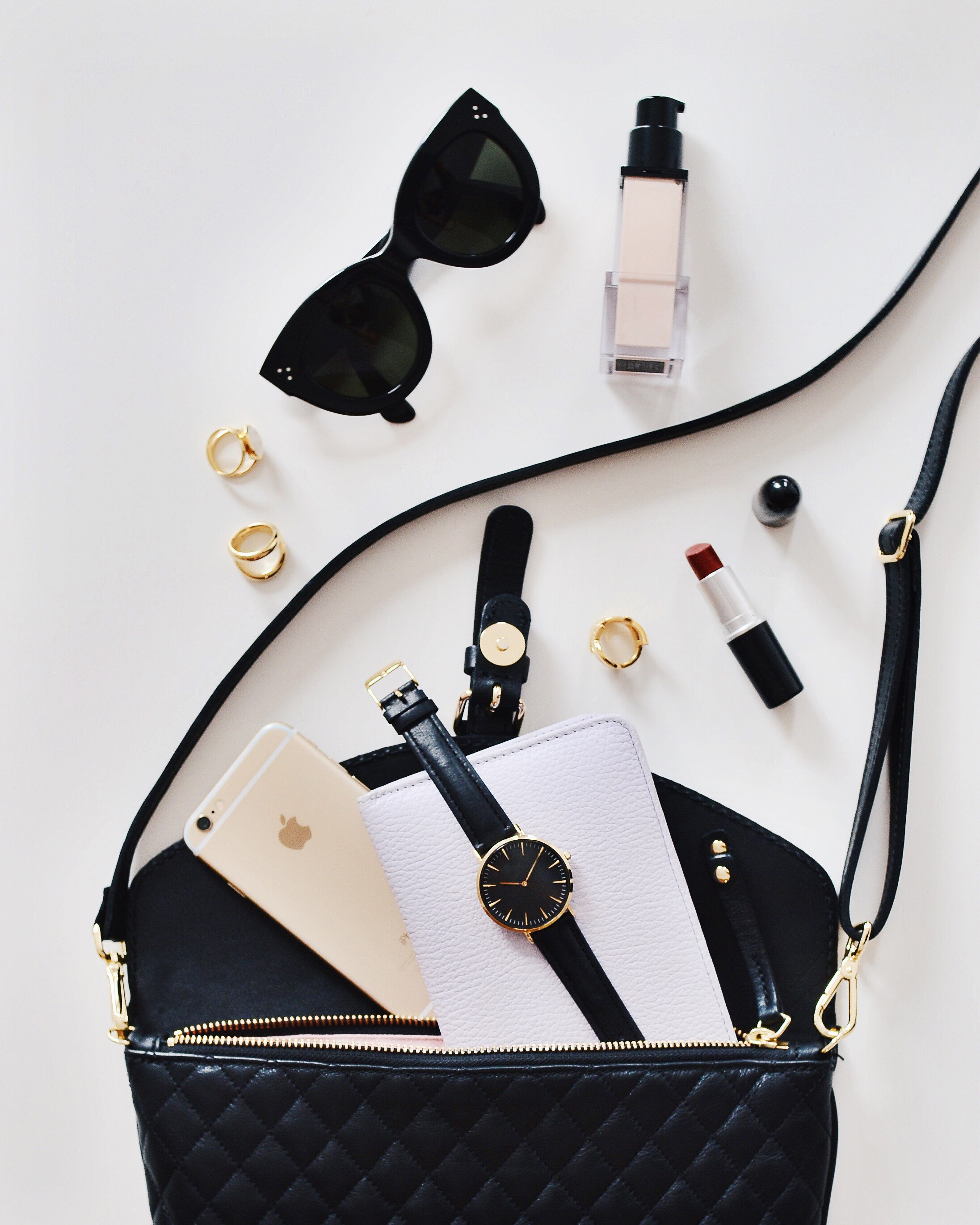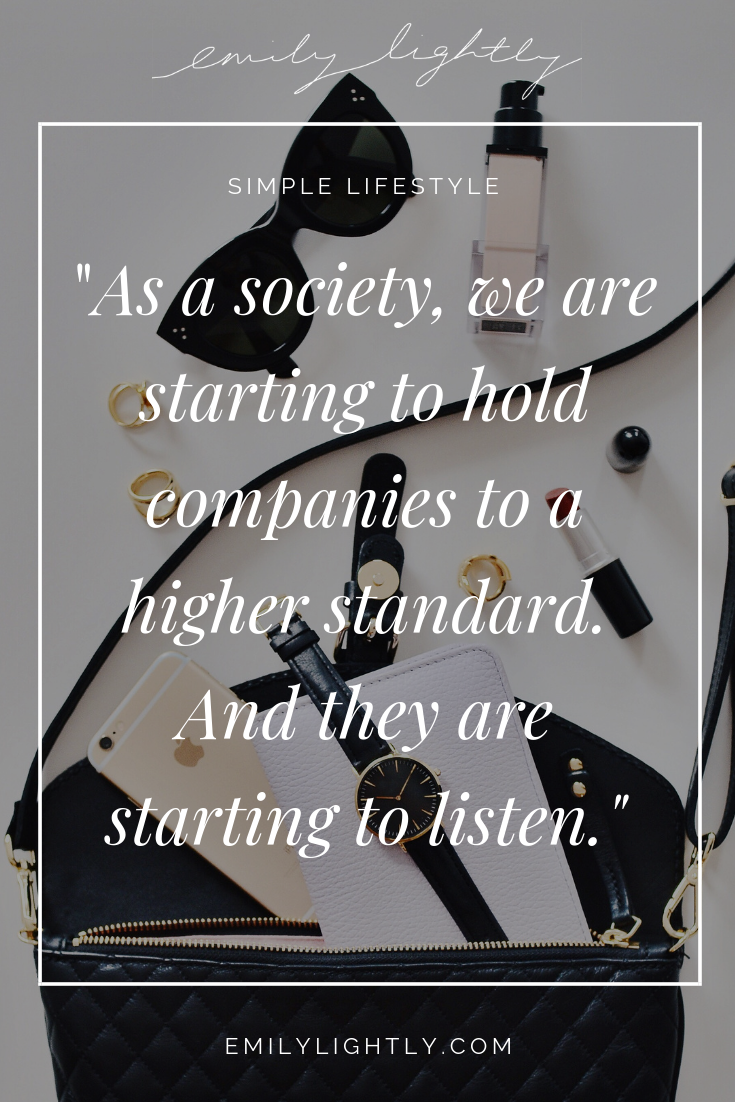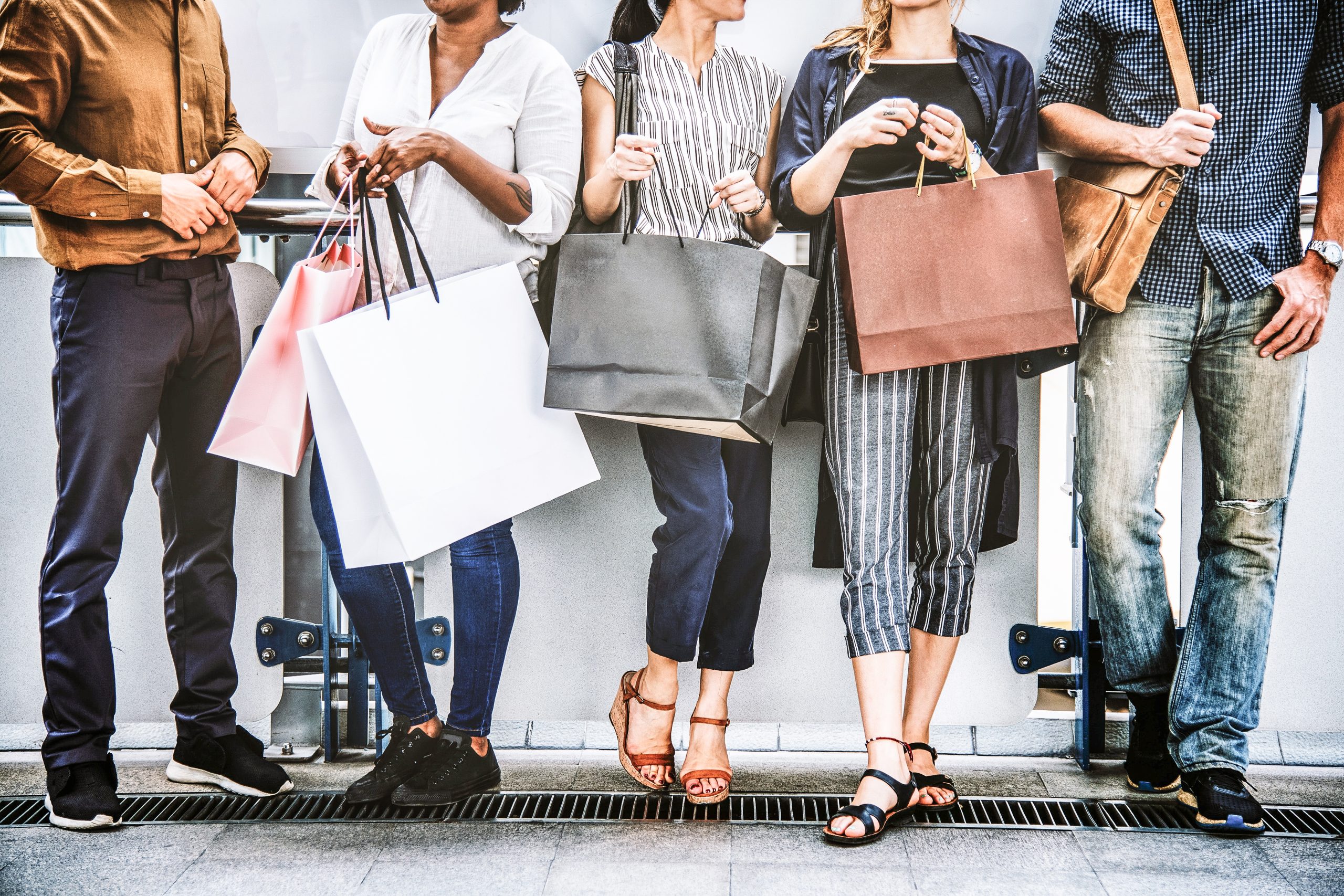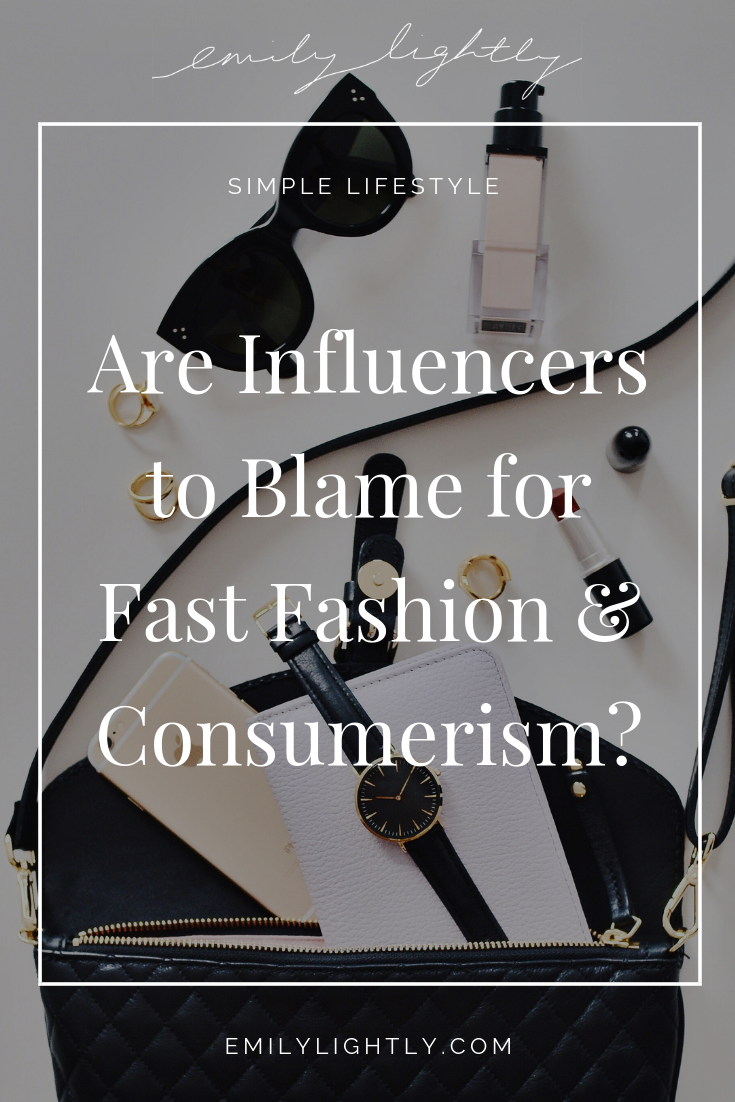I was watching a vlog from one of my favourite bloggers the other day. In it, she was showing all of the new clothes she recently purchased for an upcoming trip. It made me almost cringe when she talked about what she had bought, in particular one item that she will ‘definitely still wear after her trip’ – to which my response was, well I sure hope so.
I started thinking back to all the times I’ve seen her do a haul on her channel and how much stuff is sitting in her wardrobes. She definitely goes through a lot of clothes, and has a huge influence among her many followers in terms of encouraging them to purchase the products she features. I’ve followed her for so long that I didn’t really think much of it even as I began my journey towards minimalism and living more simply. But slowly I have been realizing that her content, which I still enjoy watching, sort of goes against what I stand for now.
So I thought, maybe I’ll reach out to her with a letter imploring her to change her ways and slow down her consumption for the sake of both the environment and the people who make all of the products she’s telling us to buy. But then I had to wonder, is all of this consumerism really her fault? There’s a huge amount of influencers out there today, getting brand deals and sponsorships and making commissions off selling products to their followers. But are they really the ones to blame for all of the over-consumption that is slowly depleting our planet of resources?
I had a bit of a panic moment because I consider myself an influencer, albeit one with a relatively small following. I do try to use my platform to further the conversation around more sustainable and ethical fashion, minimalism, etc. But am I still perpetuating a cycle of demand among consumers for more content, more products, more ways to spend their money? Instead of writing to this influencer I follow, I decided to write this article instead – a sort of open letter to all influencers, but also to brands and consumers.
The way I see it, when it comes to consumerism, there are three levels or parties involved. At the top we have the brands themselves, at the end we have consumers, and acting as an intermediary between the two we have influencers. Overarching all of this is society as a whole.
Brands generate demand for their products through marketing. They use advertisements to make you feel like you need a products to be a certain person or feel a certain way. Marketing often appeals to our fears. It makes us think things along the lines of “I’m not good enough if I don’t have this,” “Everyone has this and I want to fit in”, or “I’ll miss out if I don’t buy this.”
Influencers are somewhere in the middle. For the most part, they discern which brands deserve the attention of their followers, and advertise those brands through a trusted relationship with their followers. They do this because they enjoy it, for personal gain, or some combination of both (depending on the influencer).
Then we have consumers. If there weren’t such a huge appetite among consumers for people to sell them things, influencers would have no job. There is so much demand among consumers for this kind of content; if they don’t get it from one influencer, odds are they will go elsewhere.
It’s all part of a cycle. Brands market products to generate demand, including influencer marketing; and then consumers make purchases. This in turn generates more money which is placed back in the hands of brands for further production and marketing. There are two places we could break the cycle: the marketing stage, or the consumption stage. And I’m betting that companies aren’t going to start turning down our money anytime soon. Which means the cycle needs to be broken at the consumer stage.

Let’s jump back to the particular influencer I mentioned at the start of this article. I have followed her for a long time now, and I’m not ashamed to say I still enjoy her content. She is so sweet and her videos are fun to watch. She has built an amazing business for herself and is incredibly successful. And yet, I have to consider the fact that her business is built on selling products to consumers, whether it be fashion, beauty, or home/lifestyle products. She is constantly wearing new outfits, trying new makeup, and showing us what is in her home that she’s been loving right now (and hence, that we should buy).
You probably can’t even tell which blogger I’m talking about, either, because there are in fact so many doing the same thing. And they can do this because there is such an appetite for it. Their followers want this kind of content. There is some onus on the influencer for sure; consumers see this beautiful woman who has it all, and of course they want to be like her. But you can’t force someone to change, especially when they’re seeing success from their efforts – it comes down to their individual beliefs and morals.
I’m not saying that she’s a terrible person for what she does. We all need to get by somehow and if this is what makes her happy, go for it. I just wish her content was more conscious with regard to the issues our society is facing. I wish she would acknowledge that there is a danger to the environment and fast fashion is having a negative impact. She could still provide similar content but remind her followers that she doesn’t need all of these things, and neither do they. She could blog about secondhand purchases over new ones, or how she re-uses old makeup and re-styles old clothing in her closet to make them feel fresh and new again. There is so much content you can create that still fulfills that creative urge and still falls within the fashion/beauty/lifestyle realm, but that has a much different impact on the hundreds or thousands of people who are watching you and who are being influenced by everything that you are saying.
Before I started Emily Lightly, I tried starting a run-of-the-mill fashion blog. I purchased new clothes to wear once for an outfit shoot that then sat at the back of my wardrobe. I bought things because it’s what other bloggers did and I thought it would help me succeed. That one didn’t last long. I wanted to keep blogging because I loved it, but something just didn’t feel right.
When I watched the minimalism documentary, I had the “Aha!” moment. On one hand I had my love of fashion, and on the other I had my morals and ethics and desire to help the planet. I put my two hands together and the path presented itself to me. Luckily there was already a very established community of ethical and sustainable fashion bloggers and followers. I still have influence and share products, but I am very picky about the companies I partner with and have certain criteria that they need to follow. I’m hoping that my influence will have a positive impact on the environment and society as a whole.
And the community is growing. As it grows, more voices are heard and so too grows our power. As a society, we are starting to hold companies to a higher standard. And they are starting to listen. Not only that, but they are being forced to change. Burberry promised to stop burning clothes after an outpouring of criticism over the practice. More and more clothing brands are turning to sustainable and ethical methods of production. It’s a slow process, but it is starting to catch on.
Consumerism was rampant before social media and influencers. Products were simply marketed by the brands themselves, or maybe through celebrities. The overwhelming appetite that consumers have was developed over time to become ingrained into our society. Influencers are just doing what they can to get by – again, if their followers didn’t demand it, they wouldn’t have a job. It’s not realistic to place the blame on influencers, because they wouldn’t get paid if we didn’t buy everything they said we should. That’s not to say that influencers are not an extremely effective form of marketing. But while they may perpetuate the cycle, I don’t believe influencers are the ones to hold accountable for the consumerism that we’re facing today.
I believe it comes down to us – the consumers. Consumers are where it all starts with demand, and consumers are where it needs to end. There needs to be more education and conversation among the general public about what over-consumption is doing to our planet. It is really a societal shift that needs to happen. Once the demand from consumers ebbs away, brands and influencers will be forced to change their ways. It starts with us, the people, to make changes in our daily lives and show brands that we know we are enough without everything they try to sell us. The less we buy, the less resources brands will have and the less they will produce.
So, instead of writing a letter to this blogger that I follow, I suppose I’ve ended up writing one to you: my audience. What can you do to have an impact and break the consumerism cycle? As a consumer, educate yourself about the issues our planet is facing. Reduce your own consumption. Join the conversations happening on social media – for example, ask the brands of your clothing about the ethics of their production practices using the hashtag #whomademyclothes. Support brands and influencers who are championing sustainability and ethical production, or any cause that you feel is important. Perhaps even call on your favourite brands or influencers and ask them to lend their voice to this cause. Be cognizant of the fact that when you see an ad or scroll through your social feed, people are trying to sell you something. And most importantly, know that you are enough as you are, and that you don’t need anything else to feel worthy. That comes from within.
Let’s keep the conversation going. I’d love to hear your thoughts in the comments below.
Until next time,
Emily
Further reading:
Consumers Have Huge Environmental Impact
“You won’t make big cuts in your environmental impact by taking shorter showers or turning out the lights. The real environmental problem, a new analysis has shown, is embodied in the things you buy.”
Materialism & The Modern Consumer Society
“In this highly commercialized free market, it is almost impossible to persuade consumers to reduce their consumption levels. Yet, a call for more socially-conscious consumers would be more rational. More consumers should be aware of their power to buy and prefer products of companies that foster change. Research supports that socially-responsible consumers stand by those companies they consider to have similar morals and values as themselves.”
“When we are exposed to thousands of advertisements a day (and have been from childhood), and consumerism is promoted in most of the mental inputs we receive, this can trap us within a consumerist bubble and can mould our entire world views – our aspirations, views, lifestyles and many other things… So, the real power of consumerism comes from its cumulative effect – the fact that it has seeped into every aspect of our lives, and that these elements of our culture continually reinforce each other.”
Under the Influence: The Power of Social Media Influencers
“Promoting products via social media influencers can be categorized as a form of subconscious marketing. For ages, brands and advertisers have been seeking to shape consumers’ thoughts, attitudes, and behavior, without us even being aware of it.”
Choose your pin:

Featured photo by rawpixel on Unsplash.



Excellent article, So well written and thought provoking, Emily.
Thanks for reading!
Great article, Emily!
Thanks Celine!
Very well written. An instagrammer I follow immediately came to mind: I do enjoy her blog and content, but she is constantly (pretty much every week) showing off her “recently purchased” clothing/make up/accessories. I have no idea how she affords it! One of her recent blog posts was about all the new things she bought in October, and I added it all up and it was almost what my mortgage payment is. I just wonder how long all that sticks around in her closet before she replaces it with something new and never wears them again. I prefer a small (much smaller) wardrobe…with that many clothes, there aren’t enough days to wear them all!
So true! It’s crazy to me that that has almost become the norm or something to aspire to – new things every week, with who knows where the old stuff goes. When really the key I think to happiness is less, not more 🙂
This post was great read! These are the very issues I’m hoping to tackle in my blog! Influencers are definitely not the blame but a tool used by corporations to get us to buy things we don’t need. We live in a society that promotes greed and vanity. Instead of calling out the symptoms (influencers), we need to ask why we over-consume (predatory advertising) and what is actually pushing us to do it (corporations). I’m looking forward to reading more posts on this topic from you in the future. You’re definitely onto something that I don’t see much in blogs!
Thanks for your comment! It’s nice to see that we share this point of view 🙂